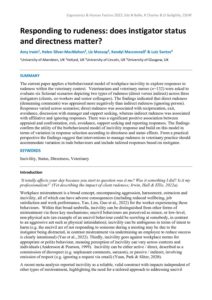| Document | Author Amy Irwin, Helen Silver-MacMahon, Liz Mossop, Kendyl Macconnell & Luiz Santos |
| Abstract The current paper applies a biobehavioural model of workplace incivility to explore responses to rudeness within the veterinary context. Veterinarians and veterinary nurses (n=132) were asked to evaluate six fictional scenarios depicting two types of rudeness (direct versus indirect) across three instigators (clients, co-workers and senior colleagues). The findings indicated that direct rudeness (demeaning comments) was appraised more negatively than indirect rudeness (ignoring person). Responses varied across scenarios; direct rudeness was associated with reciprocation, exit, avoidance, discussion with manager and support seeking, whereas indirect rudeness was associated with affiliative and ignoring responses. There was a significant positive association between appraisal and confrontation, exit, avoidance, support seeking and reporting responses. The findings confirm the utility of the biobehavioural model of incivility response and build on this model in terms of variation in response selection according to directness and status effects. From a practical perspective the findings suggest that interventions to manage rudeness in veterinary practice should accommodate variation in rude behaviours and include tailored responses based on instigator. |

